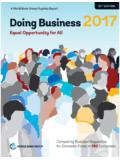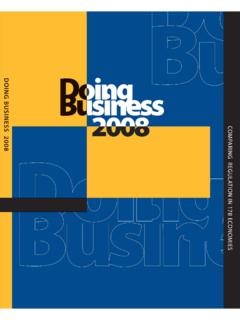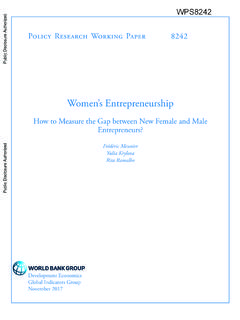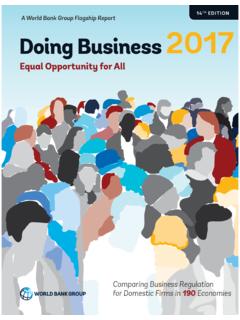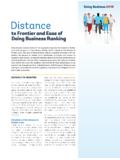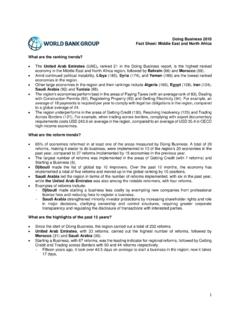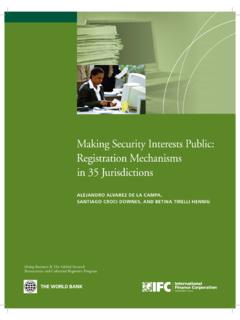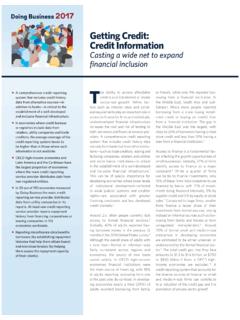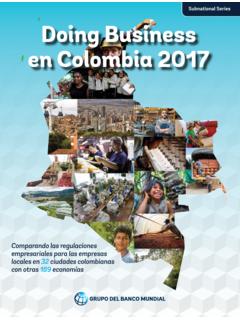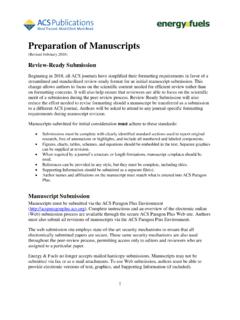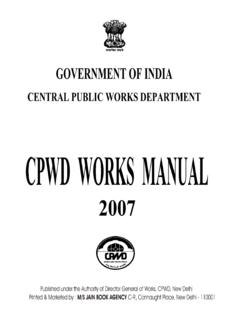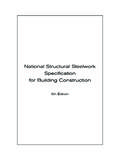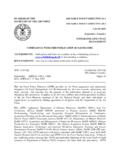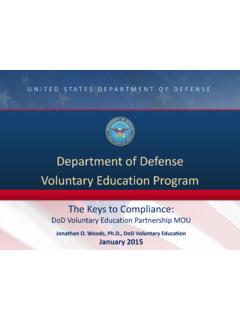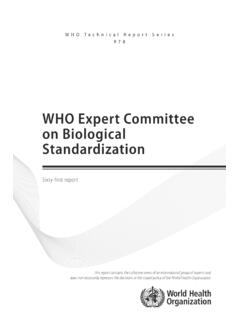Transcription of Doin˙ Busin ss in Af˙h nist n 2017 - World Bank Group
1 Doing Business in Afghanistan 2017. Comparing Business Regulation for Domestic Firms in 5 Afghan Provinces with 189 Other Economies 2017 International Bank for Reconstruction and Development / The World Bank 1818 H Street NW, Washington DC 20433. Telephone: 202-473-1000; Internet: Some rights reserved 1 2 3 4 19 18 17 16. This work is a product of the staff of The World Bank with external contributions. The findings, interpretations, and conclusions expressed in this work do not necessarily reflect the views of The World Bank, its Board of Executive Directors, or the governments they represent. The World Bank does not guarantee the accuracy of the data included in this work. The boundaries, colors, denominations, and other information shown on any map in this work do not imply any judgment on the part of The World Bank concerning the legal status of any territory or the endorsement or acceptance of such boundaries.
2 Nothing herein shall constitute or be considered to be a limitation upon or waiver of the privileges and immunities of The World Bank, all of which are specifically reserved. Rights and Permissions This work is available under the Creative Commons Attribution IGO license (CC BY IGO). Under the Creative Commons Attribution license, you are free to copy, distribute, transmit, and adapt this work, including for commercial purposes, under the following conditions: Attribution Please cite the work as follows: World Bank. 2017. Doing Business in Afghanistan 2017. Washington, DC: World Bank. License: Creative Commons Attribution CC BY IGO. Translations If you create a translation of this work, please add the following disclaimer along with the attribution: This translation was not created by The World Bank and should not be considered an official World Bank translation.
3 The World Bank shall not be liable for any content or error in this translation. Adaptations If you create an adaptation of this work, please add the following disclaimer along with the attribution: This is an adaptation of an original work by The World Bank. Views and opinions expressed in the adaptation are the sole responsibility of the author or authors of the adaptation and are not endorsed by The World Bank. Third-party content The World Bank does not necessarily own each component of the content contained within the work. The World Bank therefore does not warrant that the use of any third-party-owned individual component or part contained in the work will not infringe on the rights of those third parties. The risk of claims resulting from such infringement rests solely with you. If you wish to re-use a component of the work, it is your responsibility to determine whether permission is needed for that re-use and to obtain permission from the copyright owner.
4 Examples of components can include, but are not limited to, tables, figures, or images. All queries on rights and licenses should be addressed to World Bank Publications, The World Bank Group , 1818 H Street NW, Washington, DC 20433, USA; fax: 202-522-2625; e-mail: This publication was made possible through support provided by the USAID Mission in Afghanistan, Agency for International Development, under the terms of Award No. AID-EGEE-G-15-00001. The opinions expressed in this publication are those of the author(s) and do not necessarily reflect the views of the Agency for International Development. Doing Business in Afghanistan 2017. Comparing Business Regulation for Domestic Firms in 5 Afghan Provinces with 189 Other Economies Resources on the Doing Business website Doing Business Subnational and regional in Afghanistan 2017 projects Differences in business regulations at the subnational and regional level Current features News on the Doing Business project Historical data Customized data sets since DB2004.
5 Rankings How economies rank from 1 to 190. Law library Online collection of business laws and Data regulations relating to business All the data for 190 economies topic rankings, indicator values, lists of regulatory procedures and details Entrepreneurship data underlying indicators Data on new business density (number of newly registered companies per 1,000. working-age people) for 136 economies Reports Access to Doing Business reports as well /exploretopics/entrepreneurship as subnational and regional reports, case studies and customized economy and Distance to frontier regional profiles Data benchmarking 190 economies to the frontier in regulatory practice and a distance to frontier calculator Methodology The methodologies and research papers /data/distance-to-frontier underlying Doing Business Information on good practices Showing where the many good Research practices identified by Doing Business Abstracts of papers on Doing Business have been adopted topics and related policy issues /good-practice Doing Business reforms Short summaries of DB2017 business regulation reforms and lists of reforms since DB2006.
6 Contents 1 Overview Doing Business in Afghanistan 2017 is the first report of 12 Report Methodology and Scope the subnational Doing Business series in Afghanistan. It measures business regulations and their enforcement in 5. 13 About Doing Business and Doing provinces. The provinces are compared against each other, Business in Afghanistan 2017. and with 189 other economies worldwide. Comparisons with other economies are based on the 22 Starting a Business indicators in Doing Business 2017: Equal Opportunity for 30 Dealing with Construction Permits All, the 14th in a series of annual reports published by 40 Getting Electricity the World Bank Group . The indicators in Doing Business in Afghanistan 2017 are also comparable with more than 49 Registering Property 400 locations from 65 economies benchmarked in other subnational Doing Business studies.
7 All data and reports are available at 60 Data Notes 78 Province Snapshots Doing Business investigates the regulations that enhance business activity and those that constrain it. Regulations 80 Indicator Snapshots affecting four areas of the life of a business are measured 8 1 List of Procedures at the subnational level in Afghanistan: starting a business, 81 Starting a Business dealing with construction permits, getting electricity 84 Dealing with Construction Permits and registering property. These indicators were selected 91 Getting Electricity because they cover areas of local jurisdiction or practice. 94 Registering Property The indicators are used to analyze economic outcomes and 99 Acknowledgments identify what reforms have worked, where and why. The data in Doing Business in Afghanistan 2017 are current as of November 1, 2016.
8 This project was implemented by the Global Indicators Group (Development Economics) of the World Bank Group as a component of the Investment Climate Program in Afghanistan. Doing Business 2017. Overview MAIN FINDINGS. Where entrepreneurs in Afghanistan establish their businesses matters for the regulatory hurdles they face. Regulatory quality and efficiency vary across locations in the four areas benchmarked starting a business, dealing with construction permits, getting electricity and registering property because of differences in local interpretations of the law and in the efficiency of local agencies responsible for administering regulation. Good practices can be found across Afghanistan in all four areas of regulation. Reform-minded policy makers can make tangible improvements by replicating measures already successfully implemented within the country.
9 By adopting all the good practices found at the subnational level, Afghanistan would move substantially closer to the frontier of regulatory best practices and jump 11 places in the global ranking of 190 economies on the ease of doing business, moving up from 183 to 172. 2 DOING BUSINESS IN AFGHANISTAN 2017. A. t the October 2016 Brussels is only of Addressing private Business regulation reforms would help in Conference on Afghanistan sector constraints will be key to achieving creating an environment more conducive the government presented its sustained growth in the long run along to private sector growth and in attracting five-year strategic plan for achieving with reducing political uncertainty, secu- more foreign direct investment reforms self-reliance, the National Peace and rity concerns, pervasive corruption and a leading to a well-regulated land market, Development Framework.
10 The 70 coun- shortage of skilled workers. streamlined licensing procedures for tries and 30 international organizations establishing a formal business, and represented at the conference pledged It is not easy to do business in countries efficient and transparent processes development aid of US$ billion a year affected by war and violence. Conflict has a for obtaining construction permits over the next four years. This high level of particularly acute impact on the formal pri- and electricity Reforms sustained support indicates confidence vate sector. Human capital is lost as a result of regulatory institutions can improve among the international community in of violence or migration. Infrastructure transparency, professionalism and cus- Afghanistan's development prospects. and institutions are destroyed. Access to tomer service all key to strengthening Earlier the same year Afghanistan was finance becomes difficult.
